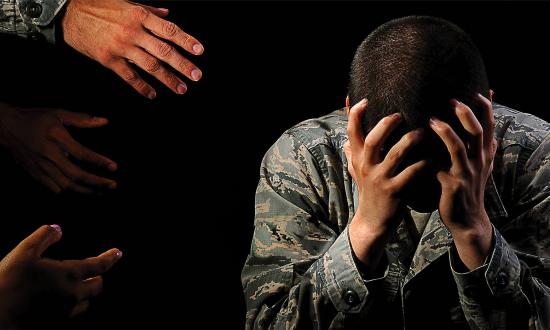To strengthen the naval profession, more attention and resources must be allocated to naval mental health providers. Awareness of and training regarding mental health and resilience are the essential principles to developing a stronger Navy.
I would like to illustrate concerns from my personal experience as a legal professional in the Navy. I have processed many nonjudicial punishments and administrative boards, as well as managed liberty risk programs. Mental health is often overlooked and unchecked, but it is equally as important as physical health.
As a legal professional in the Navy, I have drafted many packages for nonjudicial punishment. In 2017, I changed my major from business to psychology. This made me aware of trauma and how its effects are reflected in behavior. I first began to think about this issue while stationed on board USS Ronald Reagan in 2018, when my new education and work experiences converged. At that time, I was stationed on a forward-deployed ship in which our population tends to reach about 5,000 sailors and/or Marines at sea. I began to see a trend in my drafted work. Many offenders received nonjudicial punishment for identical or similar offenses. To add insult to injury, many were repeat offenders and were eventually administratively separated from the Navy. Although my position was to administer documents and ensure that my office and our proceedings were in compliance with Navy regulations, I had the opportunity to talk with these troubled servicemembers. This gave me the chance to ask the reason for the behavior and investigate what possible stimuli would trigger such responses. I felt this was important to understand the mindset of the sailors I was working with.
Tools for Success
I can recall one interaction that has never left me. One servicemember decided to use an electronic cigarette on board, which clearly violates the Uniform Code of Military Justice. This was not the first time he had done this. After finishing his documents, I could not allow him to leave without knowing why he did what he did or trying to understand his headspace. The servicemember shared his history with me, describing a very rough upbringing. From this conversation, I realized that the person must be treated before the sailor. It is futile to bark orders to a sailor when the person has not learned how to be a sailor.
Learning is defined as a change in behavior stemmed from an event that occurs in one’s life.1 Can someone be expected to unlearn behaviors they have been exposed to for the lion’s share of their life? My interaction with this servicemember showed me that he merely had not learned healthy coping skills. According to his chain of command, he was a good worker but was impressionable and made poor choices off-duty. If this servicemember had been given the proper tools for success, he might not have been in this position in the first place. Unfortunately, these life skills are not taught alongside the core Navy values at Recruit Training Command.
Ultimately, I am not sure what fate befell that sailor. However, many like him were separated during their first command. At one point, I wondered how the command could support itself with so many gapped billets. In addition to the amount of servicemembers separated for punitive reasons, there was an influx of servicemembers diagnosed with adjustment disorders. Again, I had the opportunity to speak to these servicemembers directly. These conversations solidified a thought that I had for a while: Our military is a direct reflection of the culture in the country. Being informed and aware of mental health does not excuse irresponsible behavior, but it could help us evade many problems faced not only by the armed forces but as a nation.
Investments in Sailors
To me, it didn’t make sense to separate these servicemembers after there has been such a huge financial investment in them. Each servicemember goes through basic training in Great Lakes, Illinois. If they are rated, they go off to additional training in A-schools. Some receive more training in C-schools. Counting the costs, the invested in each servicemember would include travel and medical/dental care at the very least. One could argue that good order and discipline outweighs these financial investments, but as a legal professional and aspiring psychologist, I beg to differ. From observing multiple servicemembers dealing with the same issues, I noted that many had not been exposed to healthy coping mechanisms. How can they be expected to unlearn these patterns in a matter of months? Moreover, they often connect with other servicemembers who share similar upbringings and end up in toxic environments. To support servicemembers, resilience training should be implemented alongside a greater awareness of mental health and the need for nontoxic working environments.
Many repeat offenders crossed my path. Although they received a stern lecture from the chief’s mess, then the executive officer, and lastly the commanding officer, they were put back in the same environment with little positive influence. Usually, these servicemembers spend more time in their respective workspaces than with the command’s mental health provider. Rightly so, as they are sailors and work must get done. However, how effective is one ship psychologist for upwards of 5,000 servicemembers? There is so much emphasis on physical fitness across each branch of the Department of Defense in contrast to very minimal efforts toward mental health. I believe that strides have been made, but it is not enough.
Even in 2021, business entities acknowledging mental health is still a novel concept. I always likened psychology to electricity. Everything society knows about electricity is merely theory. Individuals surmise the ways electricity works by looking at the resulted action that it has on equipment and often on other people. I treat mental health in the same manner. Emotions and thought processes are intangible, but there is empirical evidence in the behavior presented. As for the members who were separated for mental health disorders, I also feel there should be a second take before signing these separations. There were several servicemembers who I believed played the system to leave the military without fulfilling their contract. However, there were many legitimate cases in which individuals did need to leave for the safety of themselves and those around them. I want to discuss the ones who could have been retained.
Serving on board a forward-deployed vessel during the COVID-19 pandemic only magnified the existing problems. I have never seen more misguided behavior in my career, which I argue is correlated to the challenges of living as a recluse in an already restricted way of life. Junior sailors made irresponsible and selfish decisions, which then led them to my office. As these servicemembers went through the process of nonjudicial punishment, I noticed that every command-wide team was present except mental health professionals.
Criminal offenses are comprised of two components: mens rea (referring to the state-of-mind) and actus reus (the act itself or behavior). It seems as if only one of these components are taken into consideration. Making adjudication based off only a behavior without addressing the root of that behavior creates a formula for repeated incidents. Getting to the root of every servicemember’s behavior will not ensure that all misconduct is eliminated. Rather, it could help bring incidents to light. Some careers could be saved, along with some lives. Moreover, the financial investments in these servicemembers will not be wasted.
Changing Perspective
Our minds serve as the place where all our behavior begins, and that same place can be used to stop the unhealthy behavior. A simple change in perspective can make a world of difference to someone. Access to help is a great first step.
Mental health providers and resources should be expanded—particularly on forward-deployed vessels—so that servicemembers have opportunities to receive optimal care. Effective training on mental health will discourage the stigma attached to symptoms that are common among all people. Lastly, individualized resilience-building exercises for sailors and Marines who exhibit symptoms of poor mental health and coping skills will help retain servicemembers and benefit the Navy as a whole.
1. Russell A. Powell, P. Lynne Honey, and Diane G. Symbaluk, Introduction to Learning and Behavior, 5th ed (Cengage, 2017).






